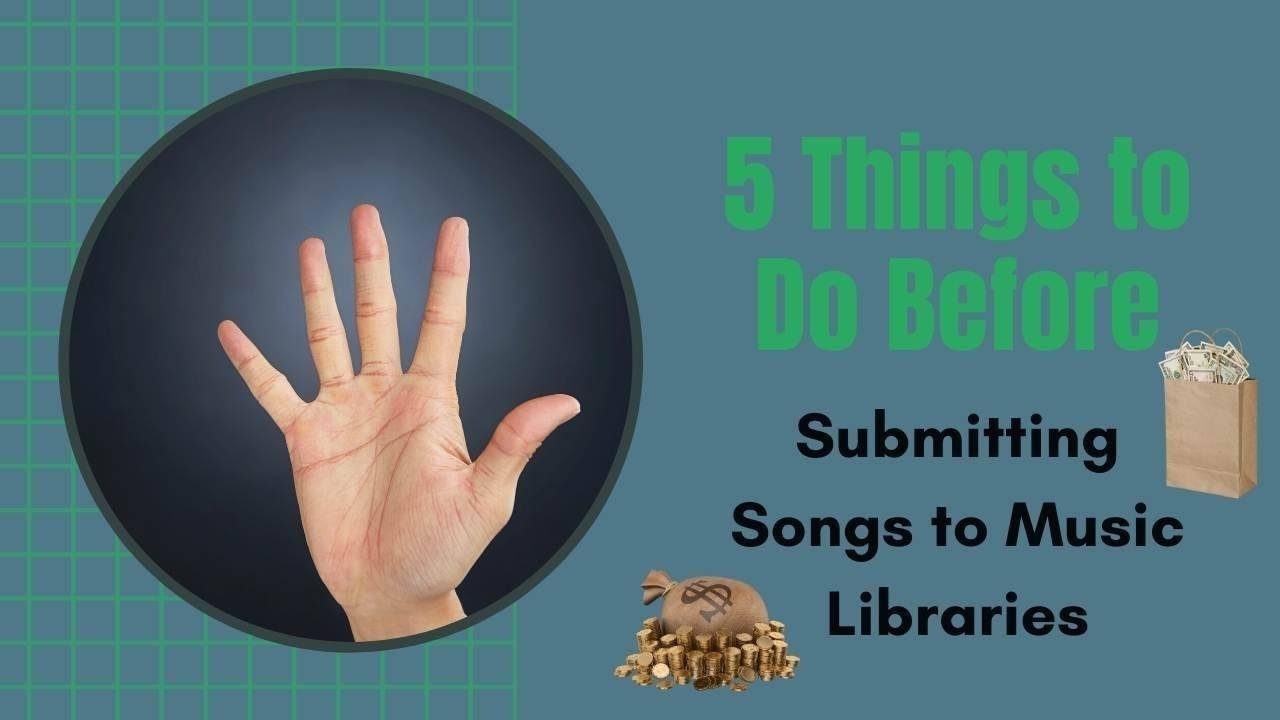Do These 5 Things Before Submitting to Music Libraries

Have you been interested in earning money from your music by licensing it? Well, before you start submitting your music to libraries, be sure to do these five things. If you don't, you're more likely to get reject by libraries and earn less from your songs!
- Write Songs with Strong Intros
- Make Sure Your Song is Constantly Evolving
- Mix & Master Your Song Well
- Only Focus on Uploading Your Songs to the Best Libraries
- Be Sure to Register with a PRO for Backend Royalties
We'll get into each of these topics below. But in case you're not yet sure what you're doing, check out this complete beginner's guide on how to license your music.
And if you're looking for a little more structured guidance, I invite you to join hundreds of students who have taken part in this free five-day music licensing challenge.
Write a Strong Intro
Before you submit your song to a music library, be sure to really think about its structure. I want you to pay special attention to the intro.
Now, put yourself in the shoes of client looking to license a song. They're going through dozens of a tracks on a music library's website, hoping to find the perfect one.
How long do you think you have to catch their attention before they move on? Five seconds? Twenty seconds?

You need to be sure that your song includes an attention-grabbing intro, or the potential client will move on. Follow these five-tips for writing the perfect song intro.
And you also need to make sure that your intro is an honest representation of what's to come. Music for licensing should be consistent in vibe and genre throughout, unlike in popular music. So don't start a hip hop song with a fancy classical introduction.
Let a potential client know upfront the type of song they're listening to.
#2 Keep Your Music Constantly Evolving
This point is really related to the first point above. If you want music libraries to consider your tracks, and clients to buy them, you need to do more than just capture their attention with a good intro.
You need to keep their attention!
Unlike a lot of the popular music these days, stock music needs to constantly evolve. Most stock music doesn't rely on a singer to tell the story. Instead, it's your job to keep things interesting as a stock music composer.
This means that you'll need clearly distinguished verses and choruses. And every four to eight bars, the song should be building (or receding). For example, the verse should build into the chorus, and then perhaps the end of the chorus can break back down into the verse.
You also need strong transitions between each section of your song. Drum fills work great. So do reverse cymbals, risers, and new instruments fading in.
#3 Mix & Master Your Song Well
Mixing and mastering for music licensing isn't too different than from other genres. But you do need to pay attention to a couple of things if you want libraries to accept your songs.
First, your songs need to sound professional. They don't need to be Grammy-winners, but they do need to sound clean and punchy. Follow these tips from a BBC-Trained mixing engineer to make your mix sound better.
Second, you don't need to have the loudest master ever. In fact, I recommend against it! Please, please, leave a ceiling of at least 1dB on your masters.
Why?
Well, when you submit your music to a music library, they automatically place an "audiomark" on your track. This is typically a voiceover of the library's name. This can increase the volume of your song, and if it coincides with a peak, it could result in a clipped demo version of your song for clients.

If you're not sure how to get started mastering, here are the best mastering plugins used by all the pros.
#4 Focus On Uploading to the Best Music Libraries
There are hundreds, maybe thousands, of music libraries out there. But not all are created equal.
Only a few of them will result in significant sales.
But they can all take a long time to upload your music to!
That's why I recommend that you only submit your music to the best libraries.
Here are some of my favorite non-exclusive music libraries:
- Pond 5 Music Licensing Review
- AudioSparx
- AudioJungle Music Licensing Review
- SongTradr
Whatever you do, don't upload your music to all the music libraries!
#5 Be Sure to Register With a PRO
If you're going to be submitting your music to music libraries, you absolutely need to be a member of a performing rights organization like ASCAP or BMI.
I've used BMI for years and have been very happy with it.
When your song is broadcast on TV or featured on Netflix, for example, you are entitled to songwriter royalties. I've earned thousands of dollars through BMI from song performances.
Registration is simple and doesn't cost very much. If you're serious about music licensing, and want to put your music libraries, you need to be registered with a PRO, otherwise your going to be leaving money on the table.
Conclusion
I wish you incredible success in licensing your music! If you do these 5 things before submitting to music libraries, you'll have more songs accepted and earn more sales.
If you're ready to take the next step in licensing your music, be sure to sign up for the free five day music licensing challenge.
And if you've got any questions, just leave a comment below!
From a Frustrated Producer in a Ragtag Bedroom Studio to Major Placements on TV Earning $1,000s!
My name is Evan, and I've been making music since around 3rd grade. I'm from San Diego, California, but I've lived in Washington, DC for the last 20 years.
While I still have a full-time day job, I have created systems that have allowed me to produce dozens of songs a year in my spare time.
My songs have been on Netflix, TV shows like the 90 Day Fiance, an award-winning indie film, and NPR’s “All Thing Considered.” They've also been streamed millions of times.
In addition to being a music producer, I am passionate about teaching people how they can make professional-sounding music and earn money licensing it, all in their spare time.
Thousands of musicians, like yourself, have trusted me to guide their musical journey. My YouTube videos have been watched nearly a million times. And my story has been in Forbes, Side Hustle Nation, and the Side Hustle School.





